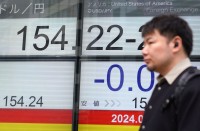Oil prices rallied for a second straight day on Thursday (March 26) after Saudi Arabiaand its Gulf Arab allies began air strikes in Yemen, sparking fears of a bigger Middle East battle that could disrupt world crude supplies.
The military operation against Houthi rebels, who have driven the president from Yemen’s capital Sanaa, has not affected oil facilities of major Gulf producers.
But fears the conflict could spread has stoked concerns about Middle East oil shipments.
One market analyst said some investors were nervous about the possible disruption to supply.
“What is playing out in investors’ minds – and on the ground – is the potential threat to supply caused by the escalation of violence and military action in the Middle East,” said head of research at Charles Stanley, Jeremy Batstone-Carr.
Carr added that he didn’t believe it constituted a major threat to global oil supply.
“I don’t think at the precise moment in time anyone is anticipating or building in a problem with oil supply into the equation. I think if that were the case we would probably have expected the oil price to spike much higher than it has,” he said.
Saudi rival Iran, which backs the Houthi rebels, denounced the air strikes. Russian PresidentVladimir Putin, in a phone conversation with his Iranian counterpart, called for an “immediate ceasefire.” Pakistan, a Riyadh ally far away from the conflict, promised a “strong response” to any threat to Saudi integrity.
U.S. Secretary of State John Kerry touched on the conflict with Iran’s foreign minister before talks on Thursday on Tehran’s nuclear issue.
Analysts doubt any possibility of an all-out war and say only a temporary lift to oil prices is expected amid continued worries about oversupply.
Benchmark Brent oil jumped 5 percent before paring gains as the dollar rebounded from Wednesday’s drop, making dollar-denominated commodities costlier in other currencies.
Brent was up $2.45, or 4 percent, at $58.93 a barrel by 1:00 p.m. EDT (1700 GMT). U.S. crude rose $1.70 to $50.91.
Yemen’s relatively small oil output has been disrupted for months. But more importantly, Arab producers have to ship their crude past the Yemen coastline via the Gulf of Aden to get to theSuez Canal, a key passageway to Europe.
The waters between Yemen and Djibouti, known as Bab el-Mandeb, are less than 40 km (25 miles) wide, and considered by the U.S. Energy Information Administration to be a “chokepoint” for global oil supplies. The EIA estimated 3.8 million barrels per day passed through Bab el-Mandeb in 2013. Egypt sent naval vessels on Thursday to help secure the passage.
Reuters







